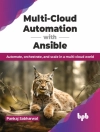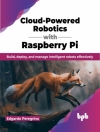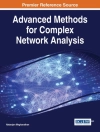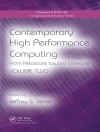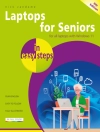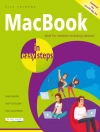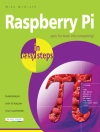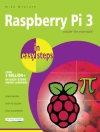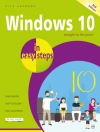This book constitutes refereed proceedings of the Second International Conference on Big Data, Machine Learning, and Applications, Big DML 2021. The volume focuses on topics such as computing methodology; machine learning; artificial intelligence; information systems; security and privacy. This volume will benefit research scholars, academicians, and industrial people who work on data storage and machine learning.
Jadual kandungan
Android application-based security surveillance implementing machine learning.- Realtime Object Distance Measurement Using Stereo Vision Image Processing.- An Insight on Drone Applications in Surveillance Domain.- Handwritten Mixed Numerals Classification System.- Io T Based Smart Farm Monitoring System.- An Extensive Review of the Supervised Learning Algorithms for Spiking Neural Networks.- Multitask learning based simultaneous facial gender and age recognition with a weighted loss function.- VISUALIZING CRIME HOTSPOTS BY ANALYSING ONLINE NEWSPAPER ARTICLES.- Applications of Machine Learning for Face Mask Detection during COVID-19 Pandemic.- A cascaded deep learning approach for detection and localization of crop-weeds in RGB images for oral presentation.- Ensemble of Deep Learning Enabled Tamil Handwritten Character Recognition Model.- A Comparative Study of Loss Functions for Deep Neural Networks in Time Series Analysis.- Learning Algorithm for Threshold Softmax Layer to Handle Unknown Class Problem.- Traffic Monitoring and Violation Detection using Deep Learning.- Conjugate Gradient Method for finding Optimal Parameters in Linear Regression.- Rugby ball detection, tracking and future trajectory prediction algorithm.- EARLY DETECTION OF HEART DISEASE USING FEATURE SELECTION AND CLASSIFICATION TECHNIQUES.- Gun Detection System for Surveillance Cameras using HOG assisted KNN classifier.- Optimized detection, classification and tracking with YOLOV5, HSV color thresholding and KCF tracking.- Covid-19 detection using chest X-ray images.- Comparative Analysis of LDA Algorithm for Low Resource Indian Languages with its Translated English Documents.- Text Style Transfer: A Comprehensive Study on Methodologies and Evaluation.- Classification of Hindustani Musical Ragas using One Dimensional Convolutional Neural Networks.- W-Tree: A Concept Correlation Tree for Data Analysis and Annotations.- Crawl Smart: A Domain Specific Crawler.- Evaluating the effect of leading indicators in customer churn prediction.- Classification of Skin Lesion Using Image Processing and Res Net50.- Data Collection and Pre-Processing for Machine Learning-based Student Dropout Prediction.- Nested Named Entity Recognition in Multilingual Code-Switched NLP.- Deep Learning based Semantic Segmentation of Blood Cells from Microscopic Images.- A Partitioned Task Offloading Approach for Privacy Preservation at Edge.- Artificial Intelligence in Radiological Covid19 Detection: A State of the Art Review.- Anomaly Detection in SCADA Industrial Control Systems using Bi-directional Long Short-Term Memory.- Implementing Autonomous Navigation on an Omni Wheeled Robot Using 2D Li DAR, Tracking Camera and ROS.- Analysis of Deep Learning Models for Text Summarization of User Manuals.- Modelling Seismic Performance of Reinforced Concrete Buildings within Response Spectrum Framework.- A Survey on DDo S Detection using Deep Learning in Software Defined Networking.- A data driven approach to predict the risk of readmission among patients with Diabetes Mellitus.- Segmentation of dentin and enamel from panoramic dental Radiographic image (OPG) to detect tooth wear.- REVISITING FACIAL KEY POINT DETECTION – AN EFFICIENT APPROACH USING DEEP NEURAL NETWORKS.- A Hybrid Framework using Natural Language Processing and Collaborative Filtering for Performance Efficient Feedback Mining and Recommendation.- Facial Recognition based Automatic Attendance Management System using Deep Learning.- Improved Hamming-Space Based Nearest Neighbour Big Data Retrieval Algorithm.- Application of Infrared thermography in assessment of Diabetic foot anomalies: a treatise.- A Survey and Classification on Recommendation Systems.- Analysis of Synthetic Data Generation Techniquesin Diabetes Prediction.- Beyond Information Exchange: An Approach to Deploy Network Properties for Information Diffusion.- Sentiment Analysis on worldwide COVID-19 outbreak.- Post Vaccination Risk Prediction of COVID-19: Machine Learning Approach.- Offensive Language Detection in Under-resourced Algerian Dialectal Arabic Language.- A Comparative Analysis of Modern Machine Learning Approaches for Automatic Classication of Scientic Articles.- A review of Machine Learning algorithms on different Breast cancer datasets.- The Online Behaviour of the Algerian Abusers in Social Media Networks.- Interactive Attention AI to translate low light photos to captions for night scene understanding in women safety.- AI visualization in Nanoscale Microscopy.- Convolutional Gated MLP: Combining Convolutions & g MLP.- Unique Covariate Identity (UCI) Detection for Emotion Recognition through EEG Signals.- A Simple and Effective Methodfor Segmenting Lung Regions from CT Scan Images using K-Means.- Risk-Based Portfolio Optimization on Some Selected Sectors of the Indian Stock Market.
Mengenai Pengarang
Dr. Laiphrakpam Dolendro Singh is an Assistant Professor in the Department of Computer Science & Engineering, National Institute of Technology Silchar, Assam, India. He receives his Master’s Degree and a Ph.D. degree from the National Institute of Technology Agartala, India, and the National Institute of Technology Manipur, India respectively. His research interests are cryptography, cryptanalysis, watermarking, and steganography. He has published several research papers in reputed journals. He is a life member of the Cryptography Research Society of India. He has acted as chair of various international conferences.
Dr. Malaya Dutta Borah is an Assistant Professor in the Department of Computer Science and Engineering, National Institute of Technology Silchar, Assam, India. Her research areas include data mining, Block Chain technology, cloud computing, e-Governance, and machine learning. She has authored several book chapters and over 44 papers in reputedjournals and conferences. She is awarded two Australian Patents. She has edited several books published by reputed international publishers.
Dr. Nitin Auluck is an Associate Professor in the Computer Science and Engineering Department of the Indian Institute of Technology Ropar. He obtained his B. Tech. in Electrical and Electronics Engineering from Poojya Dodappa Appa College of Engineering Gulbarga in 1998 and a Ph.D. in Computer Science and Engineering from the University of Cincinnati USA in 2005. His research interest is in fog/edge computing. He has published several research papers in top-tier journals and conferences. Currently, he is serving as an Editor for the journal Concurrency and Computation: Practice and Experience (CCPE), published by Wiley.
Prof. Valentina Emilia Balas is currently a Full Professor in the Department of Automatics and Applied Software at the Faculty of Engineering, “Aurel Vlaicu” University of Arad, Romania. She holds a Ph.D. Cum Laude, in Applied Electronics and Telecommunications from the Polytechnic University of Timisoara. Dr. Balas is the author of more than 350 research papers in refereed journals and International Conferences. Her research interests are in intelligent systems, fuzzy control, soft computing, smart sensors, information fusion, modeling, and simulation. Dr. Balas is the director of the Intelligent Systems Research Centre at the Aurel Vlaicu University of Arad and the Director of the Department of International Relations, Programs, and Projects at the same university. Dr. Balas was past Vice-president (responsible for Awards) of IFSA – International Fuzzy Systems Association Council (2013-2015), is a Joint Secretary of the Governing Council of the Forum for Interdisciplinary Mathematics (FIM), – A Multidisciplinary Academic Body, in India, and recipient of the “Tudor Tanasescu” Prize from the Romanian Academy for contributions in the field of soft computing methods (2019).



